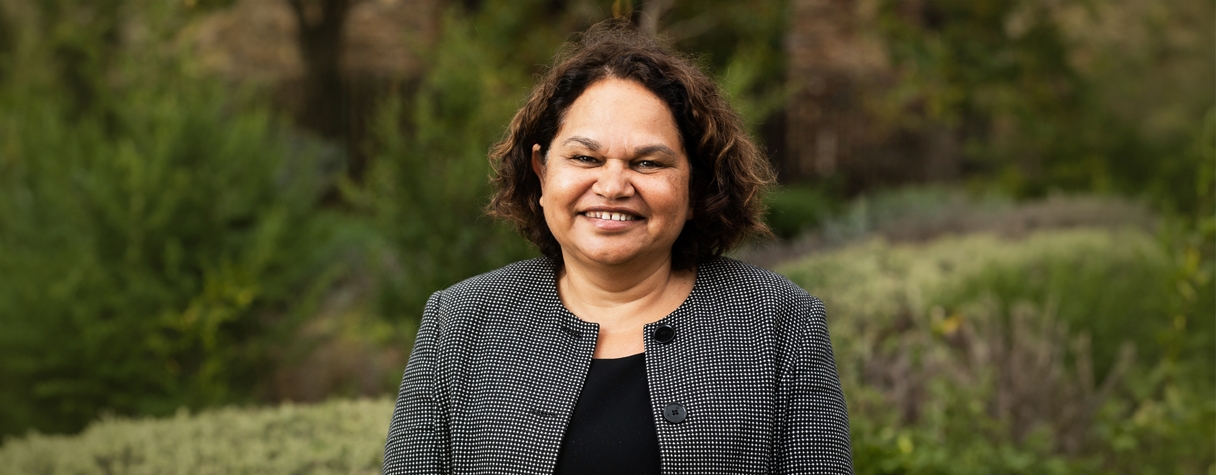
Professor Sandra Eades
Chief Medical Advisor – First Nations Health
Professor Sandra Eades (BMed, PhD, FAHMS) is Associate Dean Indigenous and Rowden White Chair in the Faculty of Medicine, Dentistry and Health Sciences at the University of Melbourne. Sandra is a Noongar woman from Mount Barker, WA, and is a recognised as a leader in Aboriginal health. Sandra was Australia’s first Indigenous person trained in medicine to be awarded a PhD. Professor Eades is an Initiating Fellow of the Australian Academy of Health and Medical Sciences. Professor Eades’ awards and recognition include the Lowitja Institute Inaugural Award for Leadership in Aboriginal health research (2015), the Medical Journal of Australia Research Publication Award (2013), and the NSW Public Health Association award (2007). In 2006 she was named the NSW Woman of the Year in recognition of her research contributions to Aboriginal communities, and in 2014 was recognised as one of 100 Aboriginal and Torres Strait Islander women living or deceased who have contributed positively to their communities in the Centenary of International Women’s Day.
Professor Eades has more than 100 career publications in the 14 years since the awarding of her PhD, including 90 peer reviewed papers of which 49 have been published in the last 5 years. The national relevance of her research can be seen in her highly cited papers which include the WA Aboriginal child health survey volume 1 (367 cites), psychosocial interventions for supporting women to stop smoking during pregnancy (708 cites), Ten principles relevant to health research among Indigenous Australian populations (163 cites), Indigenous women and smoking during pregnancy: knowledge, cultural contexts and barriers to cessation (186 cites), Infant care practices in a metropolitan Aboriginal population (60 cites), The health of urban Aboriginal people (83 cites), An intensive smoking intervention for pregnant Aboriginal women RCT (84 cites) and a Study protocol: our cultures count, the Mayi Kuwayu study, a national longitudinal study of Aboriginal and Torres Strait islander wellbeing (61 cites).
As CIA Professor Eades currently leads a NHMRC Population Health CRE (Aboriginal child and adolescent health improvement through Aboriginal leadership and collaborative research teams $2.5M) and major study of Aboriginal adolescent health as CIA ($2M). With collaborators, she is an investigator on NHMRC grants worth $13.4M including a role as CIC on a NHMRC Health Services CRE in Partnership Pathways to Better Care and Outcomes for Aboriginal Young People (2018-2022). Sandra also is a CI on the ARC Linkage Grant ‘Linking for Life’ which utilizes the Social Investment Data Resource with WA linked data from 1990-2021.
Contribution to field of research
Within the field of child health, Professor Eades' early work influenced the introduction of Commonwealth funded maternal and child health services in Aboriginal Community Controlled Health Services through the Healthy for Life policy initiative; early cohort studies of infant health demonstrate very high rates of smoking in pregnancy among Aboriginal women and high rates of environmental tobacco smoke exposure among infants. She advocated heavily for investments to tackle high rates of Indigenous smoking with much greater investments post the release of the first Indigenous Burden of Disease report. In addition to her work in child health Professor Eades led the completion and publication of the only international randomised controlled trial of a smoking intervention for pregnant Indigenous women. She hasimplemented a second randomised controlled trial of a tailored intervention to improve primary health care for type 2 diabetes among ACCHOs.
Beyond RCTs, Professor Eades has conceptualised and supervised research resulting in the publication of key methodological papers which strengthen our understanding of the psychometric properties and utility of measures of psychological distress in Aboriginal people. The first addresses the use of the Strengths and Difficulties Questionnaire with Aboriginal children and youth (Williamson 2013) and the second addresses the use of the K10 with older Aboriginal people (McNamara 2014).
You might also be interested in...

Leadership team
The Heart Foundation leadership team brings together experience from commercial, government and charity sectors to lead our fight for all Australian hearts.

Professor Garry Jennings - AO
Professor Garry Jennings has a longstanding involvement with the Heart Foundation as the Chief Medical Advisor.

Le Smith
National Manager Population Health & Wellbeing
Last updated13 March 2024
Last reviewed26 February 2024